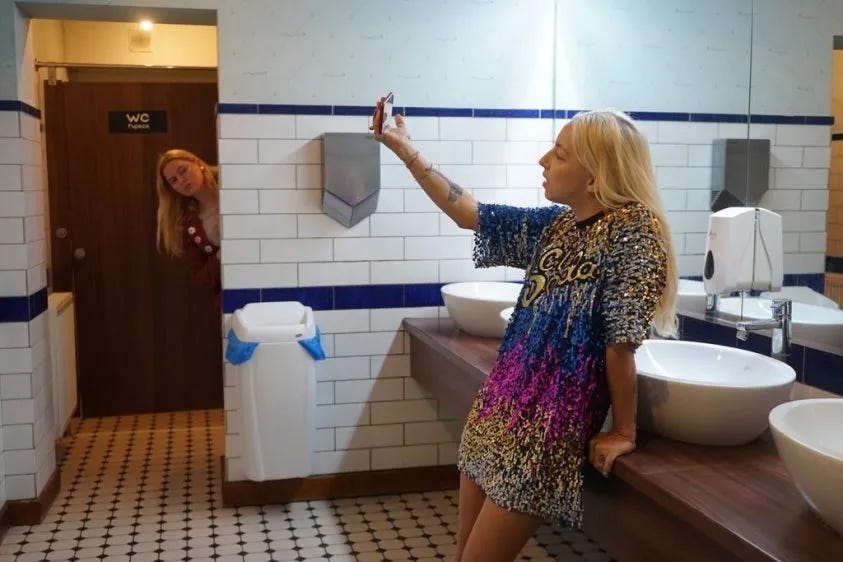[Note: I'm sharing some reviews from my recent adventure at the marvelous New York Film Festival that are not running in Bloomberg Pursuits.]
Marcel Proust gets the first laugh in Do Not Expect Too Much of the World: An alarm goes off, and when a woman in bed fumbles for the phone, her hand passes over a paperback copy of Remembrance of Things Past. Writer-director Radu Jude thus signals his intentions for this dense-daffy roller coaster of a film: It’s going to be a lot—and long, at 2 hours and 43 minutes—but it’s also going to be a hoot.
Angela (the astonishing Ilinca Manolache) stands, stretches, steps out of the room to piss, returns and puts on her panties, and then off she goes. So begins a day in the life of an overworked PA toiling on the margins of the film world of Bucharest. Her company is making a workplace safety video for an Austrian furniture maker with a factory in the city, and Angela’s main job is to “audition” injured workers for spots in the movie. She goes from apartment to apartment to tape testimonials from the wounded.
Mostly, Angela drives. And drives and drives. Let me get that right out of the way: We spend a lot of time watching her at the wheel, and there are decidedly dull stretches. But there are dull stretches in Ulysses, too. Just Imagine if James Joyce had made Leopold Bloom an Uber driver.
Don’t get me wrong—Do Not Expect offers plenty of pleasures that aren’t strictly intellectual. Among the bizarre glosses Jude tosses into the “plot” are two delightful comic counterpoints. Cinematographer Marius Pandaru shot the bulk of the movie in a grainy black and white which accentuates the documentary feel, but we get these bizarre footnotes in color.
First, there’s Angela Moves On. Periodically Jude cuts into faded sepia scenes from this 1981 Romanian melodrama about a woman cabbie and her alcoholic lover. The world has changed a great deal, especially in Romania, and the older film provides a helpful time capsule back to the days of the dictator Nicolae Ceaușescu—we even get to compare intersections then and now as our Angelas pass through them. We also take in just enough of the characters and plot of Angela Moves On to piece it’s story together, so when its two leads (Dorina Laza and László Miske) turn up playing elderly characters in Jude’s movie, we may wonder how much of their earlier roles they’ve brought along for the ride.
Second, there’s Bobita, a TikTok personality Angela pauses from time to time to bring to life when the mood strikes. Laying a video filter over her face that gives her a goofy bald head and moustache, she becomes an ersatz Andrew Tate, barking out vile snippets of misogynistic, racist, pro-Putin filth. Her tirades are utterly shocking and profoundly hilarious. It’s a brilliant move: Ingeniously borrowing the short form’s surgical satiric punch, Jude periodically brings his much more drawn-out sendup to a sudden boil.
Jude is a filmmaker who will steal and exploit whatever happens to be handy, resulting in a movie that is neither narrative nor documentary but a sort of dark comic essay on the theme of exploitation. Poor Angela is somewhere near the bottom of the film world’s chain of servitude, but she has it easy compared to the truly powerless pawns we meet from the lower reaches of the furniture-maker’s outsourced org chart. Do Not Expect is acidly funny—laugh-out-loud funny—depicting all this degradation.
Some weeks after our day with Angela, for the movie’s epilogue, we pay a visit to the workplace video’s actual shoot. Leaving our driver’s POV and shifting again to color, Jude parks us behind the camera to watch take after take. Whatever narrative threads we haven’t figured out get tied up here, and it’s all woven together into a dizzying, enraging tapestry.
At the end of Angela’s endless day, she picks up one of the Austrian overlords, Doris Goethe—yes, she’s the great-great-great-granddaughter of that Goethe—at the airport. The driver tries to engage this beautiful monster (Nina Hoss, exquisitely nonchalant here) in conversation, asking what she really knows about her company’s footprint in Romania. Angela’s heard disturbing stories about how the forests are being treated, among other things. Doris doesn’t know much about it, she says, and offers up some wisdom from the Tao. “Wu wei, right? We have to go with the flow.”
Angela nods along. That’s right—the world is going to hell, and she’ll have to go along with it. What choice does she have?




